The world of online mystery boxes has moved far beyond simple unboxing. Today’s platforms offer clash battles where players go head-to-head, opening boxes simultaneously to see who scores the most valuable prizes.
These competitive modes transform the traditional mystery box format into an interactive social experience. With real-time battles, multiplayer tournaments, and strategic gameplay elements, clash battle sites have captured the attention of collectors and casual players alike.
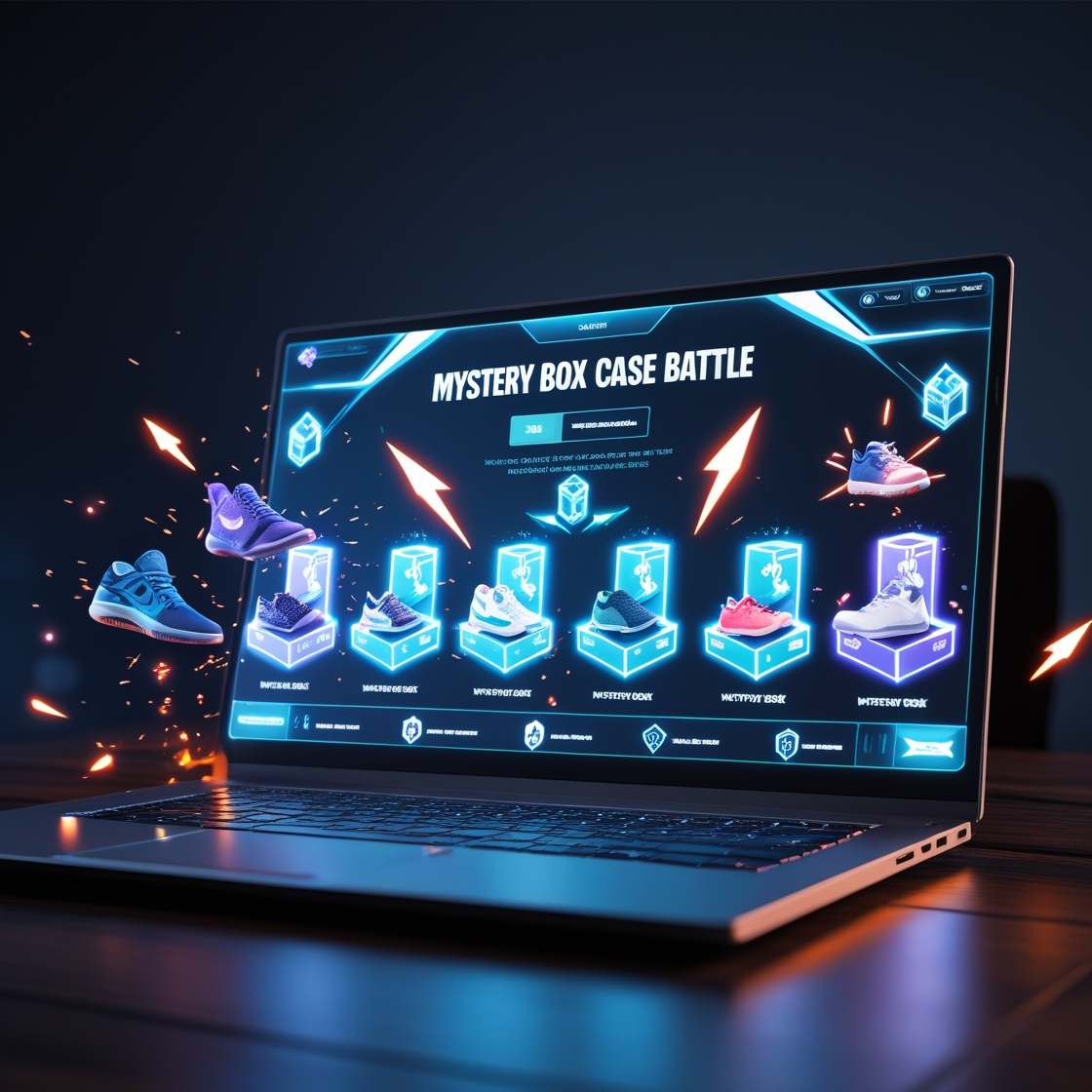
As a review team, we went hands‑on across dozens of platforms and hundreds of matches to find what feels good in real play.
JemLit emerged as our clear winner with a smooth join flow, readable scoring, and a broad mix of box categories, from streetwear to high‑end tech. In this guide, we break down the best case battle websites, look at fairness systems, and share our user‑experience notes so you can choose the right place to compete.
How We Ranked the Case Battle Sites?
We looked at joining speed, lobby activity, mode variety, and fairness. A good case battle depends on real-time values that are easy to read and rules that stay consistent. We picked these case battle sites because they made it simple to get in, follow the totals, and finish a match without confusion.
Our Top 5:
- JemLit – Simple flow, clear scoring, great to watch
- Clash.gg – Flexible setup with clear highest-value-wins rules
- Skin.club – Adds Crazy and Sharing twists to standard play
- Hellcase – Standard and Sharing, big catalog; early sign-in prompts
- Cases.gg – Straightforward winner-takes-all format
1) JemLit: Smooth, Readable Battles That Respect Your Time
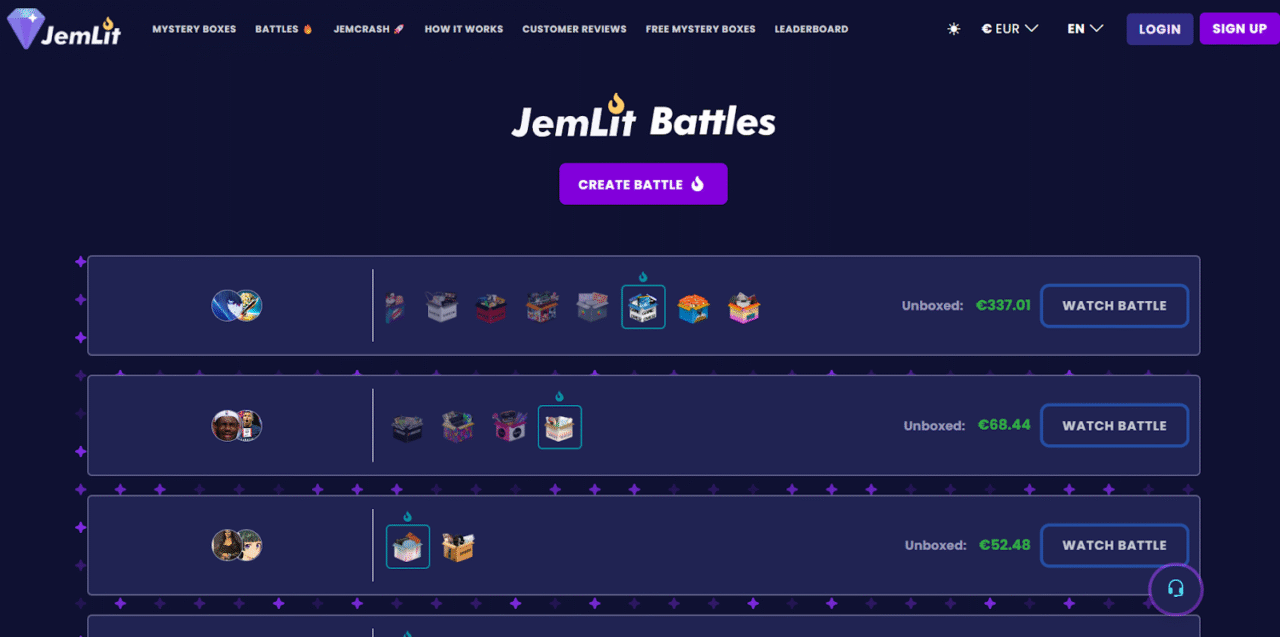
If you simply want to join, open, and see who’s ahead without hunting for info, that’s where JemLit shines. Joining a case battle takes seconds, and item values are visible at a glance while totals update cleanly, so you always know where you stand.
The watch view is friendly too: when we scouted opponents, the pull-by-pull display made it easy to see how the match was unfolding without any unwelcome noise.
Compared to other case battle sites, the flow just feels clear and uncluttered. Creating rematches is quick, and picking modes doesn’t bury you in toggles. Mobile sessions held up well in our testing, which matters if you play on short breaks.
We also appreciated the steady, low-friction path from lobby to result; it helps new users learn fast and lets regulars focus on timing and box choice instead of fighting the UI. If you’re trying this format for the first time, start here.
What We Liked
- Clean, readable battle UI with real-time totals
- Quick join/create flow; smooth rematches
- Great watch experience for learning and scouting
- Mobile-friendly layout for short sessions
What Needs Improvement
- Limited niche modes may appear later
- International promos may vary by region
2) Clash.gg: Fast Setup With Clear Rules
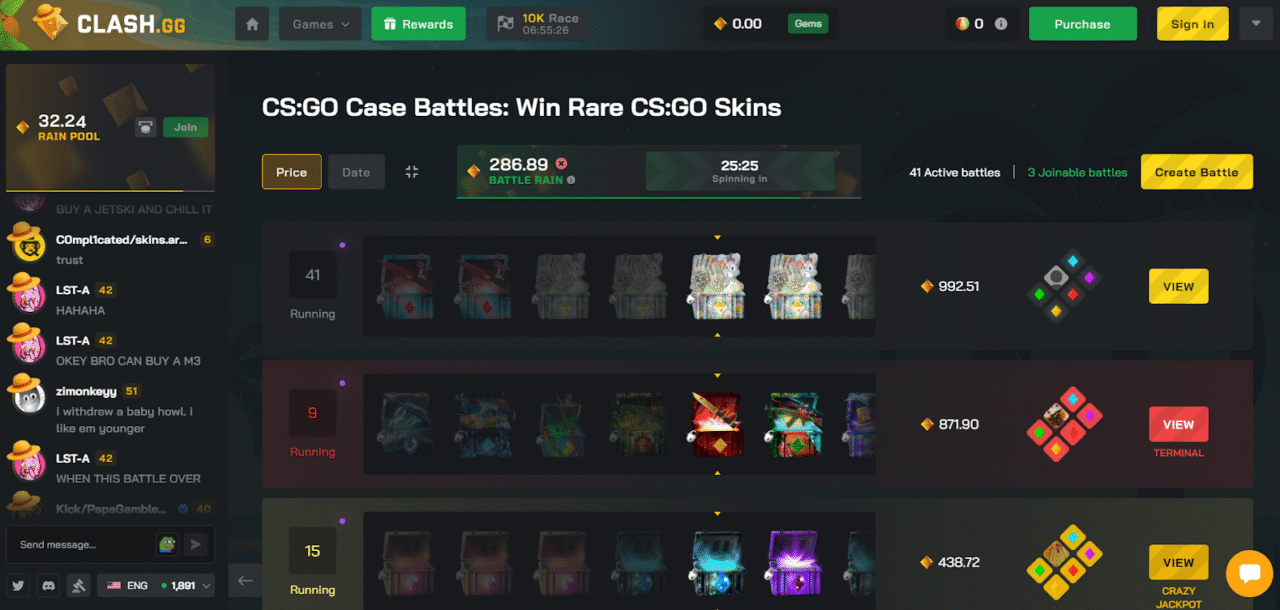
If you enjoy customizing the battles, Clash.gg lets you choose rounds and opponents (1v1, 1v2, 1v3) before you launch.
The core rule is simple: the player with the most valuable drops wins everything opened in the match. We found the dedicated page for battles helpful – you can create your own or jump into one that’s already waiting.
In our experience, the structure is friendly to both quick tests and longer sessions. Clash.gg also supports team formats such as 2v2 and 3v3 (with lobbies of up to six players) and offers simple mode choices like Normal or Group, so you can queue with friends against other teams for a more social experience. If you want flexible but straightforward play, this is a solid option.
What We Liked
- Set rounds and opponent count (1v1–1v3)
- Dedicated battles page keeps navigation simple
What Needs Improvement
- Fewer specialty modes than some rivals
- Occasional volatility may not suit cautious players (community commentary varies)
3) Skin.club: Crazy & Sharing Modes Keep Things Fresh
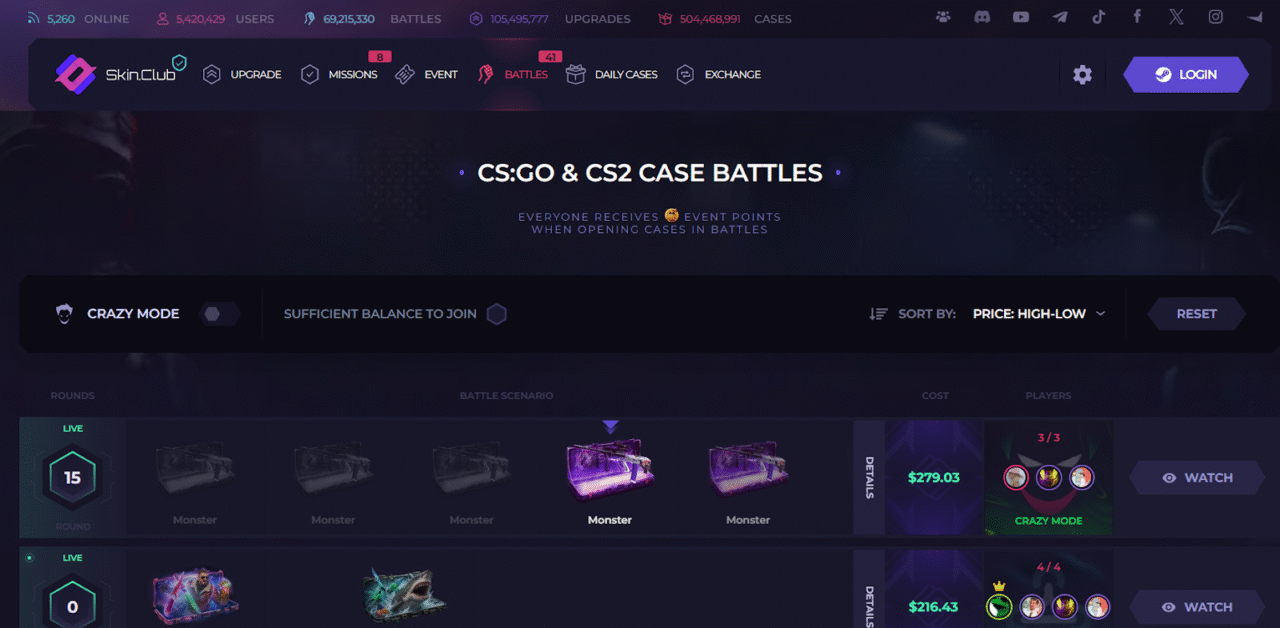
Skin.club adds two twists you might enjoy with friends. Crazy mode flips the usual logic so the lowest total value wins, which creates some funny reversals when cheap pulls suddenly matter. Sharing mode removes the single winner completely by splitting all drops equally among players.
If your group wants variety in how a match resolves, these two options deliver it. We liked being able to preview the mode rules right on the creation page, so you know what you’re opting into before the opening starts.
For us, that clarity made it easier to experiment: run a standard one, then switch to Crazy or Sharing to change the feel without learning a new interface.
It’s a nice changeup when standard formats start to feel samey. We still favor JemLit for flow and readability, but Skin.club is where we’d go when the group wants to mix formats and keep the session lively.
What We Liked
- Crazy mode (lowest total wins) and Sharing mode (equal split)
- Easy Steam sign-in and visible lobby list
What Needs Improvement
- Community opinions on value vary (as with all sites)
- Busy lobbies can move fast for beginners
4) Hellcase: Sharing Mode Is Clear; Sign-in Feels a Bit Rigid
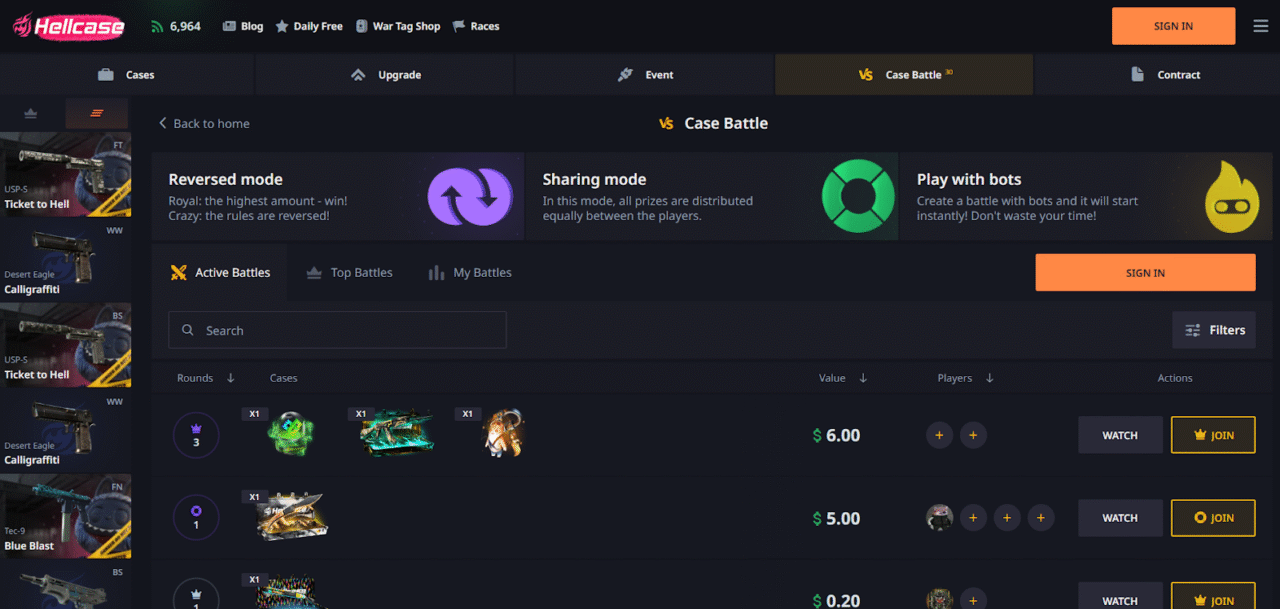
Hellcase lists Sharing mode right on the battles page – “all prizes are distributed equally between the players”- which makes the result easy to understand before you join.
Standard winner-takes-all is there too, so you can stick with the classic format if you prefer. We had no trouble finding a variety of cases and setting up quick head-to-heads.
Where we had some trouble was during sign-in. You’ll be asked to log in early in the flow, and the supported options are Steam and a limited set of social logins (Google and Telegram).
That’s fine if you already use those accounts, but it’s less flexible if you want a different email or to browse more before committing. If that doesn’t bother you, Hellcase remains a capable pick with modes you can understand at a glance.
What We Liked
- Multiple battle modes including a clearly stated Sharing mode
- Wide case selection and active community chatter (site blog/events)
What Needs Improvement
- Sign-in choices are limited (Steam/Google/Telegram), not email-first
- You’ll be prompted to log in early to see more battle details (a minor hurdle)
5) Cases.gg: Straightforward, Winner-Takes-All
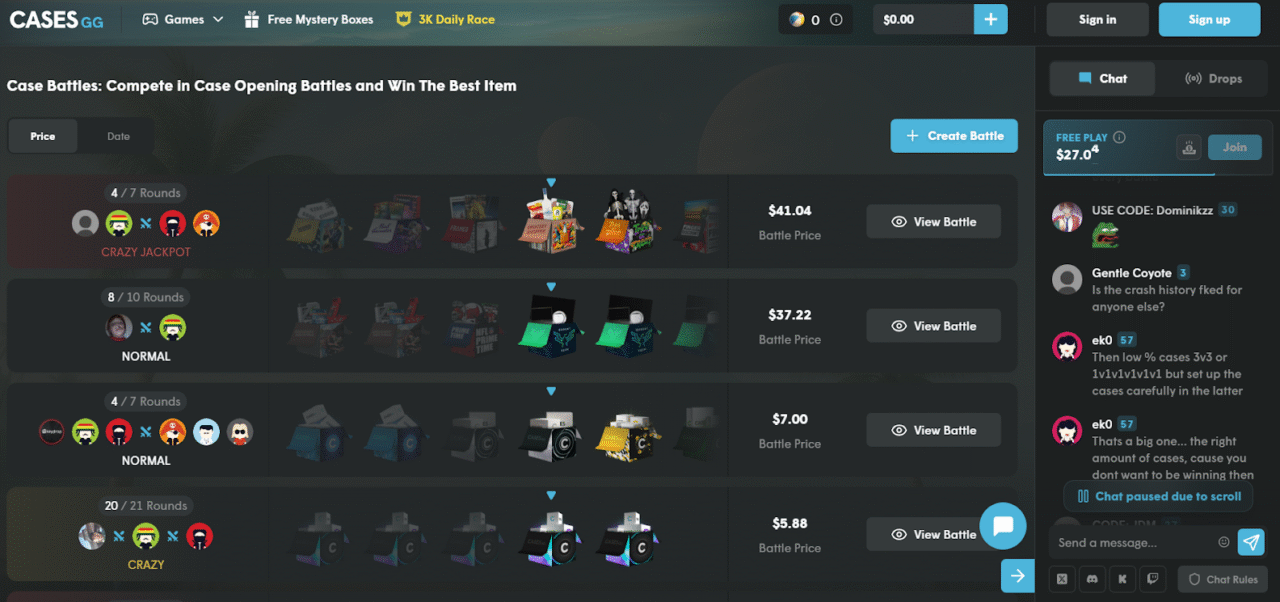
Cases.gg keeps the rules simple: multiple players open the same cases, the site totals each side, and the winner takes all items opened during the match.
You can create a lobby or join one that’s already waiting, which suits quick tests or low-effort sessions when you just want to play and go. We liked how the “how to play” outline spelled out the steps without extra jargon.
Our only caution from testing: lobby activity depends a lot on the time of day. During off-peak hours, we often saw only a handful of active lobbies, so you may wait for opponents compared to busier hubs.
If you mostly play at prime times, that may not matter. For a simple winner-takes-all case battle format with low setup overhead, it does the job.
What We Liked
- Easy rules and fast to understand
- Create/join flow is simple
What Needs Improvement
- Fewer active lobbies at times (from our observations)
- Less mode variety than multi-mode rivals
How Case Battle Formats Work (Quick Guide)
In the standard setup, everyone opens the same cases in sync, and totals are compared. A standard case battle compares those totals and awards everything opened to the higher value.
If you want to shift the feel, Crazy mode flips the logic so low totals win, which makes “bad” pulls suddenly matter. Sharing mode removes the single-winner tension and splits drops evenly, which can be a friendly way to run group sessions.
When you compare case battle sites, look for:
- Clear, real-time values during pulls;
- Stable lobbies with easy filters;
- Transparent explanations of randomness; and
- A watch view that actually helps you follow momentum.
That combination makes it easier for you to learn timing and box selection without fighting the interface. If you have limited time, these checks help you land on a platform that feels consistent from join to result.
Final Thoughts on Case Battles
Case battles work best when they’re fair, legible, and fast. In our tests, we used a simple yardstick: synced openings, live totals you can read at a glance, and a rematch flow that takes seconds—not menus. That’s why we kept gravitating to JemLit.
The battle log stays clear, totals update in real time, the watch view lets you observe without clogging the lobby, and rematches are genuinely one click. The pacing feels natural, and you always know where you stand.
If you’re choosing a home base, use the same checklist we do. Watch a few matches to gauge pacing and variance, then try lower-stakes cases to see the spread of outcomes. Check that the platform shows verifiable seeds and round IDs, explains tie rules, and discloses any platform fee.
Make sure opponents (including any bots) are clearly labeled, that there’s a clean summary after each match, and that the mobile view holds up. JemLit ticks those boxes consistently, which is why it’s the environment we trust when we want the battle to be about play—not wrestling with the interface.
Try JemLit now—clean battles, clear totals, and fast joins whenever you’re ready.
Frequently Asked Questions About Case Battles
What Is a Case Battle?
It’s a head-to-head match where all players open the same cases at the same time. The platform tracks each item’s market value and sums the totals. In the standard format, the highest total wins everything opened in the match.
What Are the Main Case Battle Modes?
Common modes are standard winner-takes-all, “crazy mode” (lowest total wins), and “sharing mode” (all drops split equally among players). Availability varies by site; Skin.club lists crazy and sharing, and Hellcase lists sharing.
Are Case Battles Fair?
Look for platforms that explain randomness and show item values in real time. Clear totals and verifiable mechanics help you trust the outcome. Reputable sites also document rules for battles and winnings.
Do I Need to Sign In Before I Can Watch?
Many platforms require sign-in to join or create matches; some prompt login earlier than others. In our testing, Hellcase asked for login early, while other case battle sites like Jemlit let us browse a bit more before joining.
What Should I Check Before Joining a Battle?
Confirm the mode (standard, crazy, or sharing), number of rounds, and the cases used. A clear lobby list, steady activity, and readable UI make the experience better. If you prefer a smooth, low-friction flow, JemLit is our top pick.

